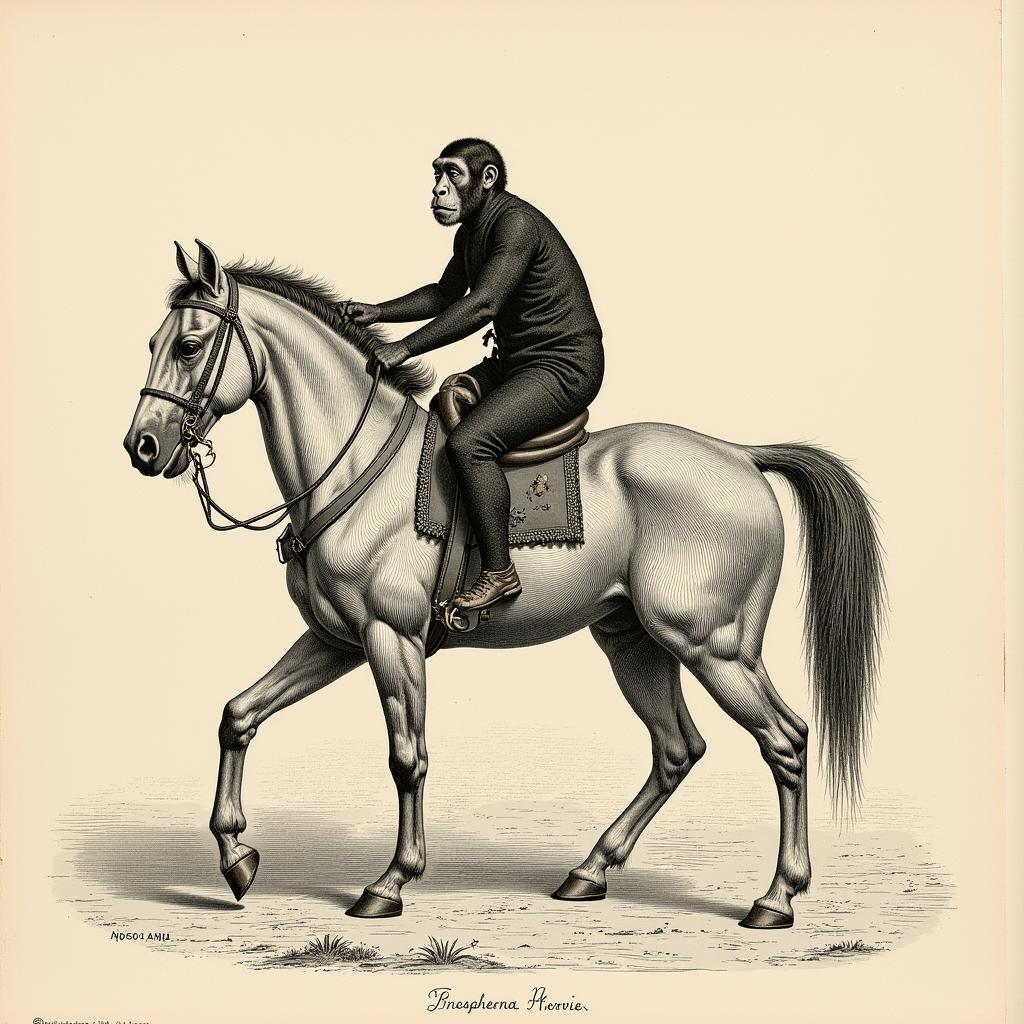The intriguing image of a monkey on a horse has captured human fascination for centuries. From ancient artwork to modern circuses, this unusual pairing raises questions about animal welfare, training methods, and the historical context of such displays. Let’s delve into the world of monkeys on horseback and explore the different facets of this complex topic.
A Historical Look at Monkeys on Horse
 Monkey Riding a Horse in a Historical Depiction
Monkey Riding a Horse in a Historical Depiction
The practice of placing monkeys on horses dates back centuries. Historically, monkeys on horseback were often seen in circuses and other forms of entertainment. These performances, while visually captivating, often raised concerns regarding the treatment and training of the animals involved. Was it playful camaraderie or forced obedience? This historical practice has largely fallen out of favor due to evolving ethical considerations regarding animal welfare. bad monkey horse The relationship between humans, monkeys, and horses in these scenarios is a complex one that deserves careful examination.
The Ethics of Monkey on Horse
The ethical implications of training a monkey to ride a horse are significant. Animal welfare experts often argue that such practices can be stressful and harmful to both animals. Monkeys are not naturally inclined to ride horses, and forcing them to do so can cause both physical and psychological distress. The training methods employed can range from positive reinforcement to more coercive techniques, and the potential for abuse is always a concern.
Understanding Monkey Behavior and Needs
Monkeys are intelligent, social creatures with complex needs. They require enrichment, social interaction, and a stimulating environment to thrive. Being forced to perform unnatural acts, such as riding a horse, can deprive them of these essential elements and lead to behavioral problems.
“Forcing a monkey onto a horse disregards their natural behaviors and needs,” says Dr. Jane Goodall, a renowned primatologist. “It prioritizes human entertainment over the well-being of these intelligent animals.”
Modern Perspectives and Alternatives
Today, the practice of using monkeys in entertainment, including riding horses, is widely criticized. Many countries have implemented laws and regulations to protect animals from exploitation and ensure their well-being. Modern circuses and other entertainment venues are increasingly moving away from animal acts and focusing on human performances.
Promoting Ethical Animal Interactions
Instead of exploiting animals for entertainment, we should focus on promoting ethical and respectful interactions. Observing monkeys in their natural habitats, supporting sanctuaries that rescue and rehabilitate primates, and educating ourselves about their needs are all positive ways to appreciate these fascinating creatures without compromising their welfare. best horse tack brands Focusing on proper horse care and understanding their natural behaviors is equally important.
The Role of Education and Advocacy
Public awareness and education play a vital role in changing perceptions and promoting animal welfare. By understanding the potential harm associated with practices like Monkey On Horse riding, we can make informed choices and advocate for more humane treatment of all animals.
“Education is key to fostering a more compassionate and respectful relationship between humans and animals,” states Dr. Emily Carter, a veterinarian specializing in exotic animal care. “By understanding their needs, we can ensure their well-being and protect them from exploitation.”
Conclusion
The image of a monkey on a horse, while seemingly whimsical, carries a complex history and raises important ethical questions. By understanding the potential harm associated with this practice and promoting responsible animal interactions, we can create a more humane and compassionate world for all creatures. The topic of “monkey on horse” reminds us of the importance of advocating for animal welfare and respecting the natural behaviors and needs of all living beings.
FAQ
- Is it cruel to make a monkey ride a horse?
- Are there any laws against using monkeys in entertainment?
- What are some ethical ways to interact with monkeys?
- How can I support animal welfare organizations?
- Where can I learn more about primate behavior and needs?
- What are the alternatives to animal acts in entertainment?
- How can I educate others about responsible animal interactions?
When you need assistance, please contact us: Phone Number: 0772127271, Email: [email protected] Or visit our address: QGM2+WX2, Vị Trung, Vị Thuỷ, Hậu Giang, Việt Nam. We have a 24/7 customer service team.